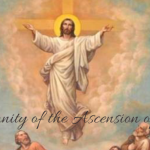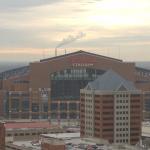 In “Silly God, Voting is for Kids”, I did something that I generally dislike: I was gave a litany of things that God is not. (It is one of my pet peeves, actually.) As surprising—albeit not uncommon—as this contradiction was, I was even more surprised when I began to type this sentence: God is not Catholic.
In “Silly God, Voting is for Kids”, I did something that I generally dislike: I was gave a litany of things that God is not. (It is one of my pet peeves, actually.) As surprising—albeit not uncommon—as this contradiction was, I was even more surprised when I began to type this sentence: God is not Catholic.
This caused me some discomfort, but I couldn’t really figure out why. So I went ahead and re-worked the original statement into a softer, less decided tone. I wrote, “Is God even Catholic? Why would God be a Catholic?”
The basic thrust of these questions has stuck with me. And much of what fascinates me is not simply a matter of what the correct answer is. Deeper down, I am curious about how asking this question affects me, and why. How and why does this particular question create this strange, unfamiliar tension in me?
After all, I am not one who is usually shy about asking questions, all kinds of questions. You may recall when I asked “Should we pray for the conversion of Satan?” or more recently when I confessed my own dissent. I don’t mind sounding edgy. But this particular question has been different to and for me. Like a small splinter, it has stayed with me and festered.
My reply here, then, is more than analysis or chop-logic: it is first and foremost a bit of work on myself. That is my hope. (By the way: this brings to mind a lovely little book on Wittgenstein’s latent Catholicism by Fergus Kerr entitled, Work on Oneself.)
In what follows I will try and distinguish two sorts of questions—and answers—to this theme that continue to make me uneasy.
In the original questions, there are two very different sorts of things being asked: (1) Is God Catholic? and (2) Is God a Catholic?
The answers I would give would go as follows: (1) Is God Catholic?—Yes, at least one should hope so; and (2) Is God a Catholic?—No, not necessarily.
Returning to the questions: there seems to be a difference between “being Catholic” and “being a Catholic.” What I mean by this is that the first question (Is God Catholic?) uses the term ‘Catholic’ in a way that is not limited to “being a Catholic.” In other words, the term ‘Catholic’ in the first question is without content if the answer is no, it makes no sense. If God is not “Catholic” in the first sense, then why should anyone or anything be “Catholic”?
However, while being Catholic (in the first sense) and being a Catholic (in the second sense) are not mutually exclusive, we need not assume that God is a Catholic. First of all, it would raise all kinds of stupid, difficult questions. Questions like, “If God is a Catholic, then, is what kind of a Catholic is God? Is God a Roman Catholic or some other kind of a Catholic?” This should show how “being Catholic” and “being a Catholic” are different at a certain level and therefore demand different kinds of answers.
Some might find this redundant and point me towards the “big C” and “little c” distinction, the difference between catholic and Catholic. I have used this distinction myself, but I think it is too generic for these questions. Yes, surely God is universal. In fact, that statement is backwards: the universe is Godly.
But my suggestion is that while God is the fullest expression of what we can possibly hope for it to mean to “be Catholic”—as Catholics of any kind, Catholicism in the widest sense—we need not assimilate God into our tribe, our history, our home team.
If God is Catholic, then, the term ‘Catholic’ is nothing but a reflection of God and God becomes the ultimate measure of this reflection. But this particular kind of Catholic reflection is not the same as registering God at our local parish (or in our Roman Church) and calling God a Catholic.
In the end, this distinction helps me make some sense out of my own Catholicism: it also helps me to understand myself in relation to God—that who I am is both God in one sense and not God in another sense.
1. I am God, God dwells in me and I image God, in the first sense of “being.”
2. I am not God, I cannot contain God, God is everything and I am nothing, in the second sense of “being a.”
God is Catholic. Otherwise, we have no reason whatsoever to imagine and practice and live in the Catholic family. But make no mistake: God is not a Catholic. Otherwise, we have no reason to imagine and practice and live in the Catholic family.
Just as we are persons but not individuals, God is Catholic but not a Catholic.
This may seem to be a petty and trivial use of language and waste of time—and in too many ways it is!—but I hope it serves to pull us (myself first and foremost) out of our complacency as Catholics without throwing out the baby with the bathwater. I also hope it shows that many people can be Catholic, the universe itself is Catholic, without being a Catholic. If it possible for God, it must be possible for man and creation.
The danger I will end with it this: we cannot allow the idea or the term ‘Catholic’ become the measure of things; God must always be the measure. And that measure is beyond the very concept of size, measurement, and, indeed, everything—even beyond the word ‘God’.
![]()
















